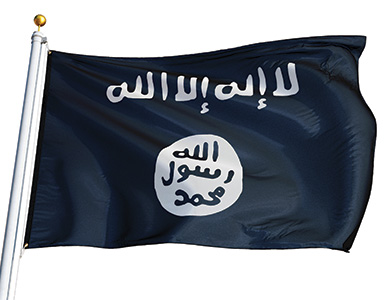
In the mid-2000s, Tricia Bacon was working on counterterrorism at the State Department, studying the ongoing negotiations between the Algerian Salafist Group for Preaching and Combat, and Al-Qaeda.
As Bacon delved deeper into the potential alliance of the two bad actors, she noticed a fundamental hole in one aspect of the analysis surrounding it.
"Nobody had looked at the broader question of whether there are common motivations for alliances between terrorist organizations," she says.
They have now. The subject became the focus of Bacon's research and of her forthcoming book, Mergers, Acquisitions, and Mayhem: Why Terrorist Groups Ally. Using primary documents including records recovered from Osama bin Laden's compound and conducting research in places like Israel, Bacon, now a School of Public Affairs professor, concluded that conventional wisdom didn't tell the whole story.
Contrary to popular belief that terrorist organizations partner due to shared ideology or common enemies, alliances are generally rooted in an organizational need that a group cannot address on its own. It's difficult for groups to ally across ideologies because they are usually insular organizations that are unique in the way they view the world.
"It's a move of weakness," she says. "Organizations don't ally if they can do things on their own. These are groups that don't want to increase the circle of people who know what they're up to and who their leaders and members are. It's very dangerous for a terrorist organization."
Groups like Al-Qaeda, and more recently, the Islamic State (ISIS), have used alliances to build strength and recruit new fighters. In turn, they can offer resources like weapons and training, as well as the cachet of being associated with their name and cause. Some alliances are formalized, Bacon says, while others are less reciprocal. As a terrorist organization becomes weaker and less effective, it may seek to connect with a larger group in hopes of boosting its prestige.
Organizations that are well aligned tend to be more difficult to defeat, she says.
"If we looked at Al-Qaeda alone, we'd think it was in trouble," Bacon says. "But if you start to include AQAP (Al-Qaeda in the Arabian Peninsula), AQIM (Al-Qaeda in the Islamic Maghreb), and Al-Shabaab, it's stronger. It is what Al-Qaeda has relied on, especially since bin Laden's death."
Bacon believes these alliances are more susceptible to disruption than the United States and other countries have demonstrated, especially during the alliance-formation phase. The United States' lack of effort in this category, she believes, is a "mistake."
In large part due to its success in forming alliances, ISIS remains the West's biggest terrorist threat, Bacon says.
"I think we're in a phase in the United States with this form of extremism where it's very hard to organize here, so it's a much more dispersed threat, which makes things like 9/11 very hard to imagine. Not impossible, but very hard to imagine. But it's not a threat that's ever going to go away. We still have a war against terrorism. It's not a war you can win, because it's always going to be part of the arsenal of asymmetric warfare. I think that's tough for Americans to take."